The Mobile CPU Core-Count Debate: Analyzing The Real World
by Andrei Frumusanu on September 1, 2015 8:00 AM EST- Posted in
- Smartphones
- CPUs
- Mobile
- SoCs
Chrome - AnandTech Frontpage
Off the bat we see quite a large difference in the power state distribution graphs. Chrome seems to place much higher load on the little cores compared to S-Browser. When looking at the run-queue chart we see that indeed all cores are almost at their full capacity for a large amount of time.
What stands out though is a very large peak around the 4s mark. Here we see the little cores peak up to almost 7 threads, which is quite unexpected. This burst seems to overload the little cluster's capacity. The frequency also peaks to 1.3GHz at this point. The reason we don't see it go higher is probably that the threads are still big enough that they're picked up by the scheduler and migrated over to the big cluster at that point.
The big cores also see a fair amount of load. Similarly to the S-Browser we have 1 very large thread that puts a consistent load on 1 CPU. But curiously enough we also see some significant activity on up to 2 other big cores. Again, in terms of burst loads we see up to 3 big CPUs being used concurrently.
The total run-queue depths for the system looks very different for Chrome. We see a consistent use of 4-5 cores and a large burst of up to 8 threads. This is a very surprisng finding and impact on the way we perceive the core count usage of Chrome.


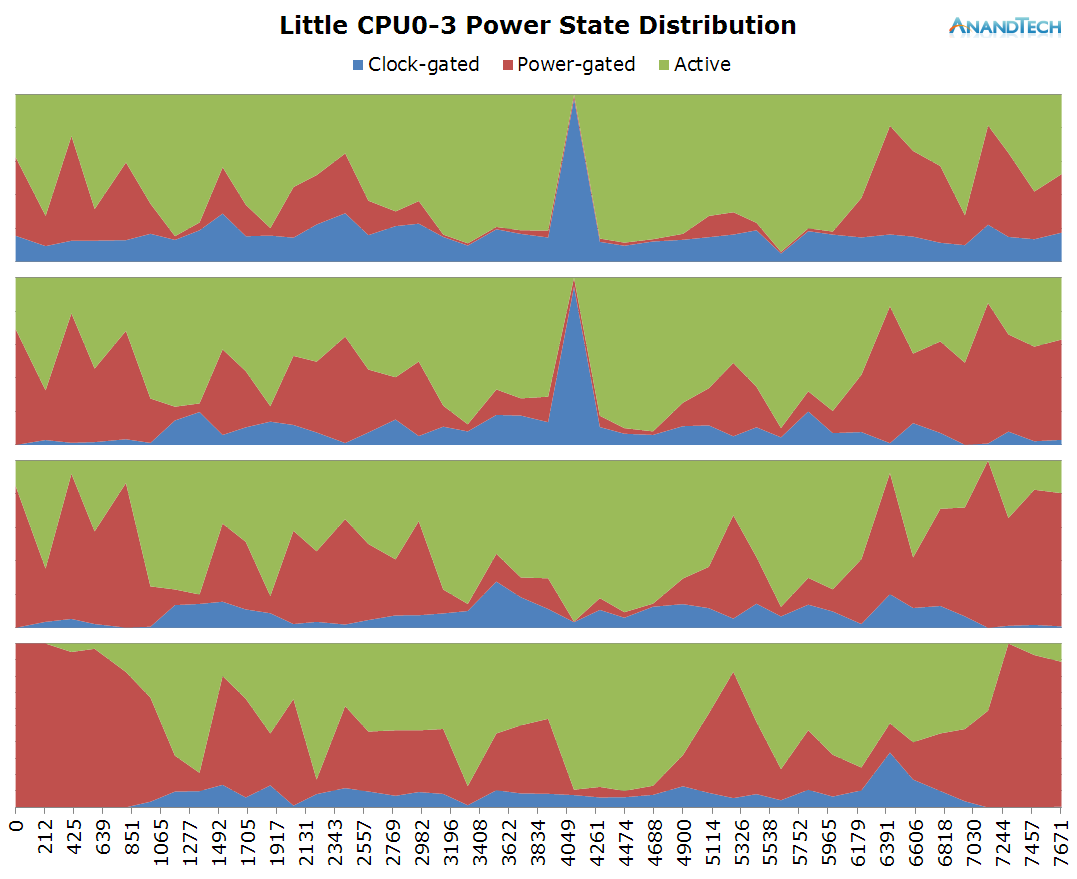
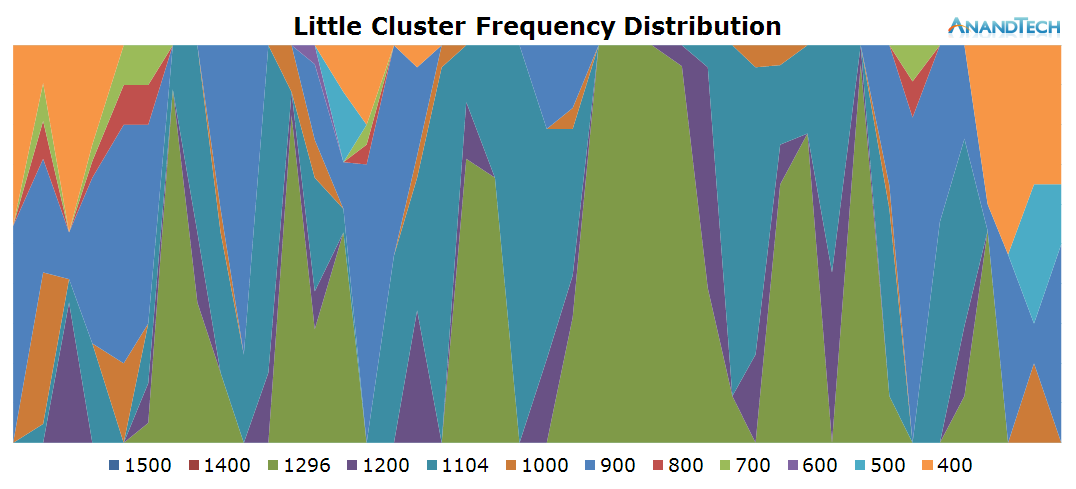
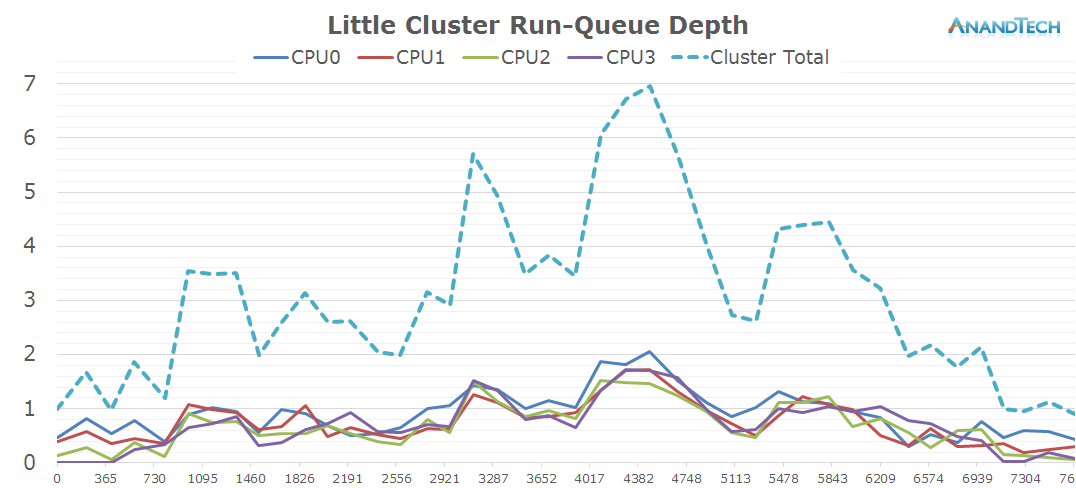
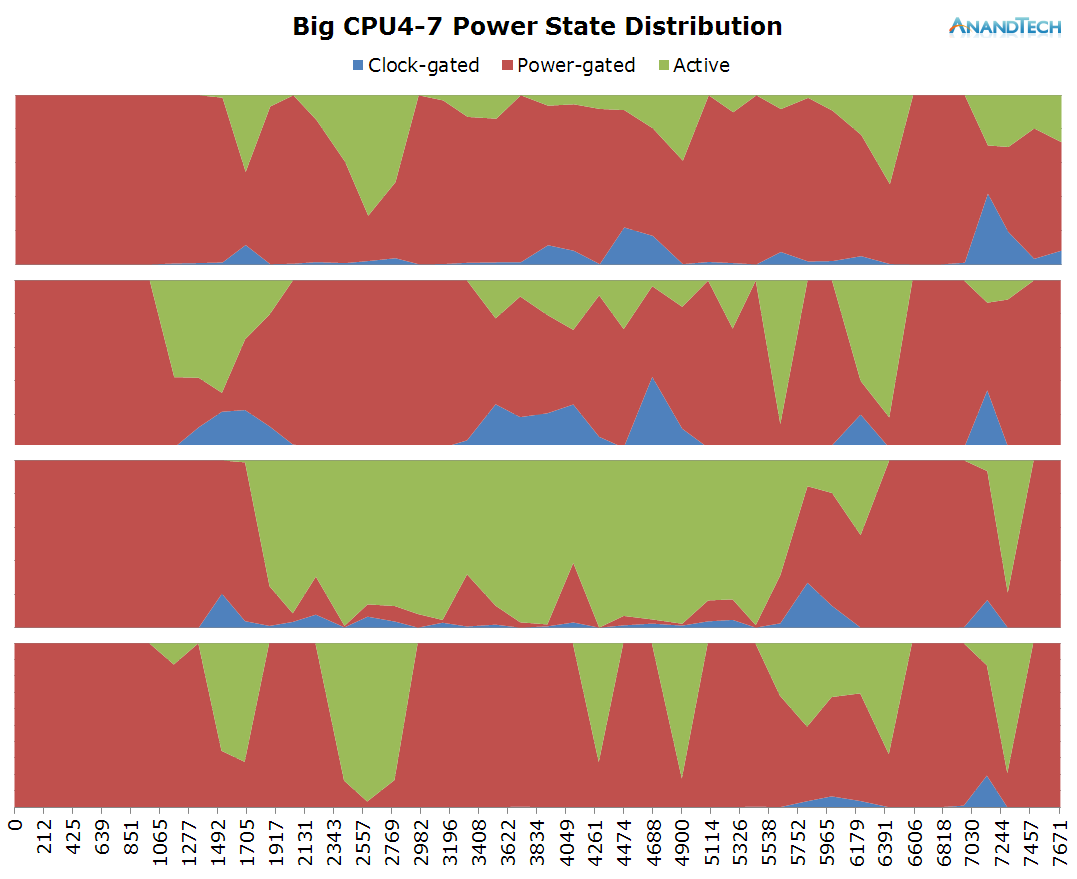
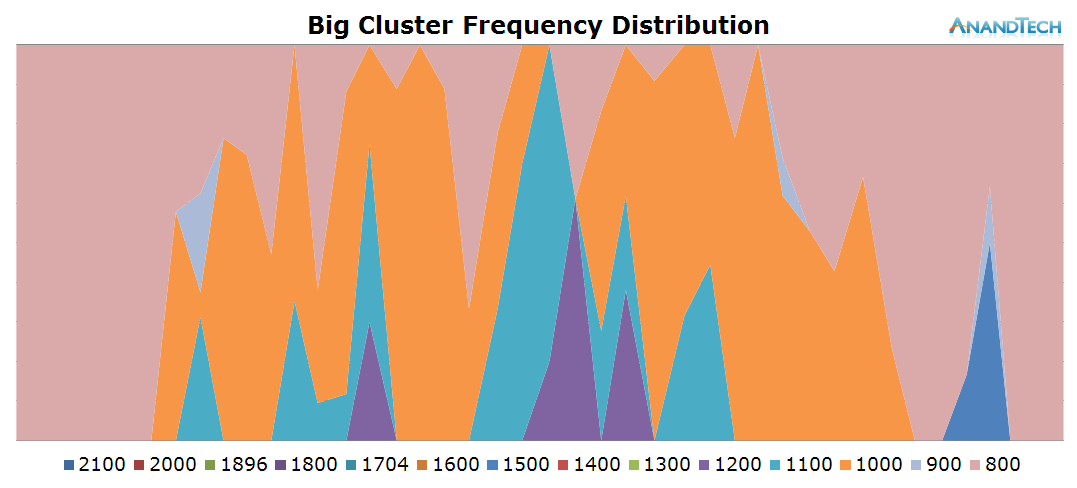
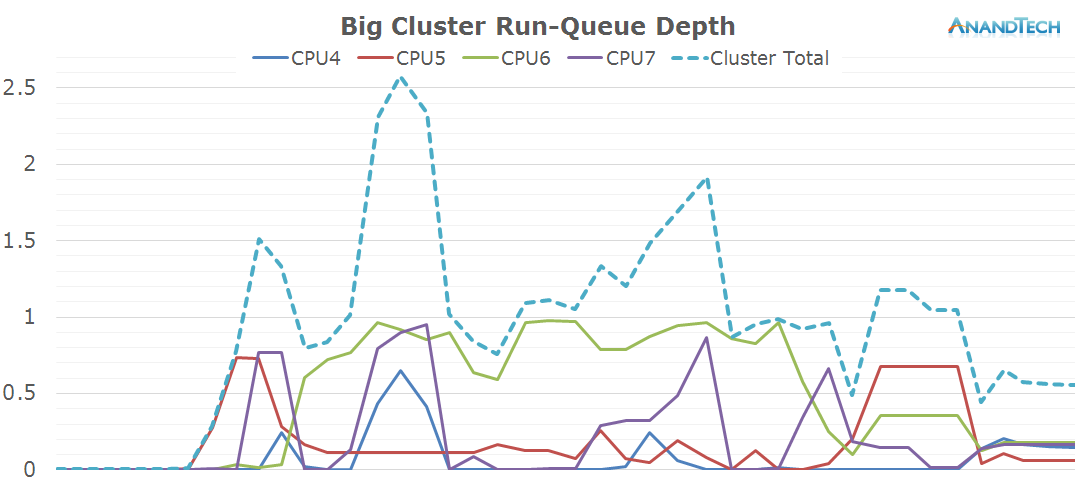
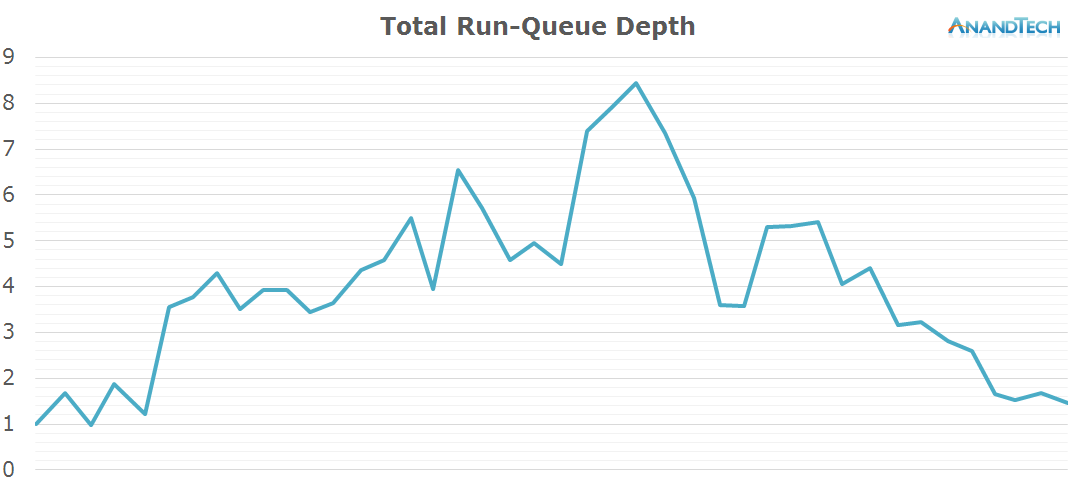








157 Comments
View All Comments
Samus - Wednesday, September 2, 2015 - link
They are both clearly android fans and haven't ever given anything else a chance. The fact they ignore Apple has consistently had superior single threaded performance in their SOC's years and this has translated to better UX just goes to show that Android targeting multithreaded performance is a solution looking for a problem. There are so many underlying issues to address first, specifically making efficient use the Linux scheduler and perhaps setting a compatibility list for hardware instead of saying just make anything and we'll find a way to run on it no matter how crappy it runs.tuxRoller - Wednesday, September 2, 2015 - link
Apple had not consistently had better performance per core. That's fairly recent (since cyclone, iirc). There are myriad issues at play.In the end, the market is best served by an open option, like Android, and customers choosing what works best for them and letting the rest fade away.
name99 - Wednesday, September 2, 2015 - link
"Apple had not consistently had better performance per core. That's fairly recent (since cyclone, iirc). "Since Swift. That's iPhone 5, 5S, 6 (2012, 2013, 2014) and likely to be 6S and 2015 at least.
Even the late-stage pre-Apple cores were substantially above average (in part because of Apple's custom SoC). The 4S was above the competition at the time:
http://www.anandtech.com/show/4971/apple-iphone-4s...
Most people would consider "consistent enough" for "long enough" to make the statement reasonable.
lopri - Wednesday, September 2, 2015 - link
And it is not like Apple don't resort to moar-cores. When they run into walls, they also have no choice but to take whatever routes that are available. Listening to some of the zealous Apple fans, one would mistake that iPhones have been rocking on a single-core all these years.They have moved to dual-cores on the phones, and 3-cores on tablets. Moar-cores on iDevices are only a matter of time. Those specialized ASICs with fancy names apple give ("Motion Processor" for one) are also a concession made by Apple that there are cases where big cores are not always the best route to take when efficiency matters.
Buk Lau - Wednesday, September 2, 2015 - link
"They are both clearly android fans and haven't ever given anything else a chance."uhh my first smart device ever is a 2nd gen iPod touch...
So just because I proved you wrong, I have to be an Android fanboy? You said you tried all these Android phones "every week" and have "shit experiences." Again, you didn't bring up any names or so. What phones have you even tried? Who's being a fanboy here and can only provide claims without backing them up with facts?
I don't understand why you are arguing about this superior ST performance when it's irrelevant to this article. What this article simply proves is that Android does make use of extra threads and you get a benefit in power efficiency due to running MT thread, nothing about performance. In fact in most scenarios shown in the test most of the little cores are even saturated which means the workload isn't heavy at all.
"Apple has consistently had superior single threaded performance in their SOC's years and this has translated to better UX"
any evidence that leads to this conclusion? also like tuxRoller said Apple only have IPC advantages in recent years with Cyclone series.
"There are so many underlying issues to address first, specifically making efficient use the Linux scheduler and perhaps setting a compatibility list for hardware instead of saying just make anything and we'll find a way to run on it no matter how crappy it runs."
Where did you get the concept of make anything and find a way to work? All OEMs and SoC manufacturers optimize for Android just like how they optimize for Windows in desktop. Like I said before, SoC manufacturers have to provide driver update every time there's a HAL change in Android. How well they can do to optimize is up to themselves but the fact is that they do have to make their hardware compatible for Android
Kutark - Wednesday, September 2, 2015 - link
Did i suddenly log onto the pcgamer forums? The instant someone expresses any level of dismay or concern for an apple product, or says they have good experiences with android phones, it automatically means they're a nutswinging fanboy?Buk Lau - Wednesday, September 2, 2015 - link
You can argue whether Apple is intentional or not but the end result is that 4S users are getting more sluggish experiences with their 4S after updated to iOS 8tuxRoller - Wednesday, September 2, 2015 - link
Linux isn't great about niceness There's a few ways to fix this. One is to use cgroups ,(which Android uses). This works pretty well but I'd still subject, ultimately, to the scheduler. The other way is to run the rt kernel. That obeys priorities nicely (heh), but would be a bear to wrestle into Android and you'd lose some power efficiency. Also the rendering framework of Android may have some issues.darkich - Friday, September 4, 2015 - link
Im calling not only BS, but a truckload of it.Just so full of ignorance and prejudice that it's probably not worth a thorough reply..if you do want one though, let me know and you will be served.
brianpauler - Saturday, July 17, 2021 - link
This is a very valuable change of Reddit. If you are a regular user of Reddit, you probably know this Reddit video downloader: